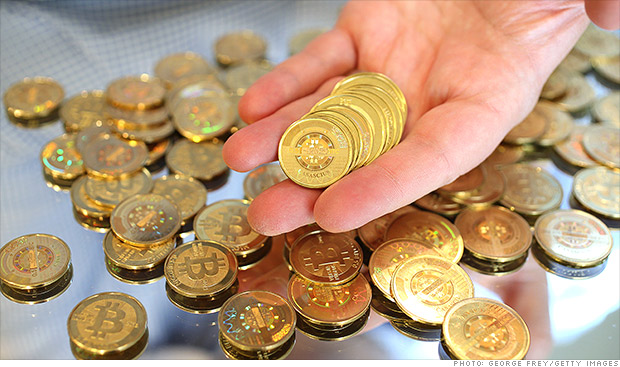
The price of bitcoins has surged. But some law enforcement officials are worried about crime tied to the mostly anonymous currency.
NEW YORK (CNNMoney) Just as the price of a Bitcoin reaches record highs, a U.S. Senate committee is taking a closer look at the world's favorite decentralized digital currency.Are tight regulations to come? Do politicians see a currency they can't track or control as a threat -- or an asset?
It's anyone's guess. But it's clear bitcoins are growing in popularity. The price of the currency soared to a new all-time high of $675 Monday, up from only $12 a year ago. Without meddling banks in between transactions, bitcoins trade seamlessly and offer nearly as much privacy as cash.
That's why the Senate Committee on Homeland Security and Government Affairs is hearing from various sides Monday. According to prepared statements from the Justice Department, an official at the DOJ said it needs more help catching criminals who use the secretive currency. Meanwhile, Bitcoin users want the government to back off and let the system blossom.
Law enforcement doesn't like the anonymity: There are legitimate uses for bitcoins. But it's also being used to anonymously buy drugs, hire assassins, trade child porn and dodge taxes.
The nation's acting assistant attorney general, Mythili Raman, described the more notorious ways bitcoins are being used. She mentioned the recent FBI shutdown of Silk Road, an online black market. Illicit drugs and services -- like hacking -- were sold there using the (mostly) untraceable currency. The agency arrested its alleged founder and seized 170,000 BTC, valued at $101 million as of Monday afternoon.
The way bitcoins are transacted -- using coded wallets and special keys that don't need real names -- enables substantial privacy. Raman said that makes it more difficult to follow the money and catch criminals. It would be easier to fight crime with "appropriate anti-money laundering and know-your-customer controls," she said.
Along those lines, there are concerns that those making money from sex trafficking and pornography involving children have started to adopt Bitcoin.
The International Centre for Missing and Exploited Children noted how anonymity offered by Bitcoin has made it the currency of choice for predators. The nonprofit group's president, Ernie Allen, says he's not against the digital economy. But he ! wants it less private.
"If the perception of anonymity diminishes, we believe the criminal use will diminish with it," he said in prepared remarks.
Edward Lowery III, who leads the Secret Service's criminal investigative division, added that the technologically complex Bitcoin system makes it hard for everyday agents to stay on targets' tails. They need more tech-savvy investigators than the agency can currently afford.
Also chiming in was the potential regulator that could one-day ruin the unregulated Bitcoin party: The Treasury Department.
Treasury already issued guidance in March saying that groups exchanging bitcoins must register with the government and keep records. Everyday bitcoin users remain unregulated. Jennifer Shasky Calvery is head of the department's financial crimes unit and warned about leaving the bitcoin community untouched.
"One of our biggest challenges is striking the right balance between the costs and benefits of regulation," she said.
The Bitcoin community doesn't want too much regulation: Fans of Bitcoin say the currency is going mainstream, and it's not just for internet weirdos. That's why they want the government to give it a chance to grow and thrive without tacking on burdensome rules.
The Bitcoin Foundation, a group that seeks to strengthen the digital system, is trying to convince politicians the currency works as is.
"The American people have been reminded this year of reasons to be concerned for their privacy," says the group's attorney, Patrick Murck, referencing the recent disclosures about unwarranted government spying on innocent citizens.
The group also notes that meetings with financial regulators have gone well so far, but the Treasury Department should have met with Bitcoin supporters before taking a stance earlier this year.
Academic researchers say that coming down too hard on the digital currency could push its innovative potential abroad.
Jerry Brito! , a senio! r research fellow at George Mason University's Mercatus Center, feels that entrepreneurs have a lot to gain from bitcoins. Without banks, they're also more accessible to the world's poorest. Plus, they're not controlled by a central bank that can run rampant printing money and bring on hyperinflation.
But regulators can't get their heads around it. They might want to treat it as a foreign currency, a commodity or a payments network -- but it's not any of those. However, stopping it would be a dumb move.
"Restricting the use of Bitcoin will only ensure that criminals alone will use the technology," Brito and research assistant Andrea Castillo wrote in a report to Congress. ![]()
This is true that the currency is going mainstream, and it's not just for internet weirdos.
ReplyDeleteRegards,
Komatsu Parts